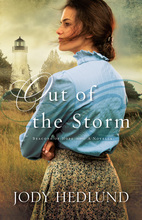To kick off her new series centered around Michigan lighthouses, Jody Hedlund tantalizes us with a novella, serving as an introduction to Presque Isle, MI (where the first full-length novel also takes place). Given its brevity, I recommend reading the novella rather than descriptions of it - it's a quick enough read, plus the writing itself is superior.
Hedlund's novella contains all her trademarks - a swift-moving storyline, romantic tension, character development - but all in a concise short story. This is among the better novellas I've read. Due to their length, it's hard to develop a strong, meaty story, but Hedlund manages better than most to balance the action, character development, and romance.
My one complaint (which probably is not an issue for many) is that the romance was a bit passionate for my prudish tastes. But it was an enjoyable story all the same, and I liked getting a feel for the series' setting.
Incidentally, this novella, which also includes the first several chapters of Love Unexpected to cruelly hook the reader a couple months in advance of its release, is free on Amazon and Christianbook.com.
Beacons of Hope
0.5. "Out of the Storm"
1. Love Unexpected
2. Hearts Made Whole
3. Undaunted Hope
Friday, October 31, 2014
Monday, October 27, 2014
Sarah E. Ladd's "A Lady at Willgrove Hall" - a sweet, gentle story
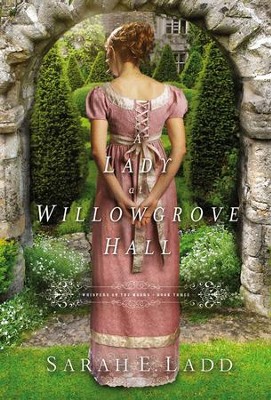 Sarah E. Ladd's third regency follows Cecily Faire, a woman who made a foolish choice in her youth and was abandoned by her father at a girls' school, losing all contact with her family. When offered a position as a paid companion for an elderly woman, Cecily accepts, knowing it could bring her closer to the last-known whereabouts of her twin sister. To her shock, there is someone at Willowgrove Hall who knows of her youthful indiscretion, someone who could, with a wrong word, see her sacked in disgrace. She finds a friend in Nathaniel Hall, steward of the estate, and his sisters, but even Nathaniel has a secret he holds close to his chest. When the secrets come to light, will they run from the past or move forward to a future?
Sarah E. Ladd's third regency follows Cecily Faire, a woman who made a foolish choice in her youth and was abandoned by her father at a girls' school, losing all contact with her family. When offered a position as a paid companion for an elderly woman, Cecily accepts, knowing it could bring her closer to the last-known whereabouts of her twin sister. To her shock, there is someone at Willowgrove Hall who knows of her youthful indiscretion, someone who could, with a wrong word, see her sacked in disgrace. She finds a friend in Nathaniel Hall, steward of the estate, and his sisters, but even Nathaniel has a secret he holds close to his chest. When the secrets come to light, will they run from the past or move forward to a future?It was fun to learn a touch more about paid companions; Cecily is unusual in that she is not impoverished gentility, but how she comes to be one seems plausible to me. I think the reality of a companion could be lonely - not a servant, she could not associate with the servants, but at the same time, she is paid and therefore an employee, not family.
I like that Cecily has matured since her foolish teenage years. Sometimes - like with Nathaniel - she is overcautious, but I can respect that. She does not want to be taken in by a handsome face again, to give more than she should. Nathaniel is an honorable man, but he holds a lot of anger. In trying to be responsible and protective, Nathaniel can be over-serious, but I like his relationship with his family - though they are occasionally irked with each other, they clearly love each other dearly.
Everyone has secrets that hold them back. The fear of being vulnerable is very real, and Cecily and Nathaniel have it in spades. There is also a strong theme of forgiveness and letting go of anger. But most touching, in my opinion, is Cecily's loneliness and desire for her family - to be loved and have that camaraderie that no else can provide. As much as I wanted to murder them in my youth, I cannot imagine losing contact with my siblings like Cecily loses her twin sister.
Headmistress of Rosemere is still my favorite of the series, and I enjoyed the cameo of Rosemere in this novel. A sweet romance, A Lady at Willowgrove Hall is a quiet, gentle read that tugs the heartstrings rather than sets the heart racing from danger.
Whispers on the Moors
1. The Heiress of Winterwood
2. The Headmistress of Rosemere
3. A Lady at Willowgrove Hall
Friday, October 24, 2014
"A Promise to Protect" by Patricia Bradley - a complex mystery/suspense
In the second Logan Point novel, Sheriff Ben Logan promises a dying man to protect his sister, Dr. Leigh Sommerall - a woman he had fallen in love with back in college, but the romance failed to work out. Leigh would prefer to avoid Ben at all costs, but with no family left except her son - her parents, grandparents, husband, and brother all dead - she is forced to rely on him for protection, since her brother's killer is after her now too. But Leigh is harboring a secret that could change Ben's life forever.
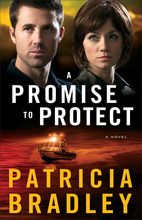
Like the book before it, I enjoyed the complexity of the case. Is there one villain? Two? More? Are all the events connected, or are there multiple vendettas? Bradley is good at dangling potential red herrings for the reader. The person I suspected most proved innocent (as did my I-really-hope-this-is-not-the-villain runner-up), for which I was kind of glad - I don't want the villain to be too obvious. And I really appreciate that the villain doesn't waste time with last-minute gloating and confessing! It makes for a stronger story when the characters don't have to rely on the villain's confession for solving the mystery.
Given the amount of hurt Ben and Leigh have been carrying around for the past decade, the focus on forgiveness is a good choice; not just for each other, but for family and self. I enjoyed the return of several characters from book one, including Taylor and her victim-profiling talents. Hopefully the cop Livy will feature in her own book next . . . Patricia Bradley writes a solid mystery with a well-played element of suspense. I look forward to her next book!
Thank you Revell for providing a free book for the purpose of review; I was not required to make it positive, and all opinions are my own.
Logan Point
1. Shadows of the Past
2. A Promise to Protect
3. Gone without a Trace
4. Silence in the Dark

Like the book before it, I enjoyed the complexity of the case. Is there one villain? Two? More? Are all the events connected, or are there multiple vendettas? Bradley is good at dangling potential red herrings for the reader. The person I suspected most proved innocent (as did my I-really-hope-this-is-not-the-villain runner-up), for which I was kind of glad - I don't want the villain to be too obvious. And I really appreciate that the villain doesn't waste time with last-minute gloating and confessing! It makes for a stronger story when the characters don't have to rely on the villain's confession for solving the mystery.
Given the amount of hurt Ben and Leigh have been carrying around for the past decade, the focus on forgiveness is a good choice; not just for each other, but for family and self. I enjoyed the return of several characters from book one, including Taylor and her victim-profiling talents. Hopefully the cop Livy will feature in her own book next . . . Patricia Bradley writes a solid mystery with a well-played element of suspense. I look forward to her next book!
Thank you Revell for providing a free book for the purpose of review; I was not required to make it positive, and all opinions are my own.
Logan Point
1. Shadows of the Past
2. A Promise to Protect
3. Gone without a Trace
4. Silence in the Dark
Monday, October 20, 2014
"Saving Amelie" by Cathy Gohlke - an astounding historical read
When learning in school about the Superman and the perfection of the Aryan type (Hitler's ideal human), the main thing we were taught was blonde hair and blue eyes. When learning about who did not fit the type, Jews, of course, were number one. In the wake of the Holocaust and genocide of the Jews, other peoples who failed to fit the Aryan type were often glossed over. Blue-eyed blondes with any physical or mental defect - deafness, blindness, epilepsy, schizophrenia, alcoholism - were also persecuted, because these "genetic defects" would weaken the Aryan race. Cathy Gohlke's novel highlights this oft over-looked group, delving into the unethical study of eugenics, the practice of improving the genetic traits of humans - in this case, through breeding the desirable specimens and eliminating the undesirable.
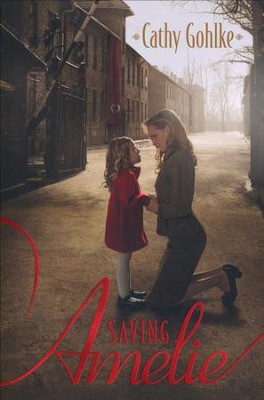 Rachel Kramer, adopted at birth, has spent years going back and forth between Germany and the USA, in which she holds dual citizenship. Though Hitler has come to power and war is on the horizon, Rachel gets dragged back to Germany again with her father, a eugenics scientist, but for the last time, she vows. While in Berlin, an estranged friend, married to Rachel's old suitor, comes to her with a fantastic tale of her husband's plan to get rid of their deaf daughter to purify his Aryan bloodline. Rachel can scarcely believe it, but she finally enlists the aid of an American journalist, Jason Young, to spirit little Amelie away. When a look through her father's disturbing research reveals secrets of her own background, Rachel must flee too, with Jason's help. However, with borders closing and the war descending, there appears to be no way out of Germany. Her only hope is in family she discovers through her father's papers - but will they trust this stranger and the deaf child that comes with her?
Rachel Kramer, adopted at birth, has spent years going back and forth between Germany and the USA, in which she holds dual citizenship. Though Hitler has come to power and war is on the horizon, Rachel gets dragged back to Germany again with her father, a eugenics scientist, but for the last time, she vows. While in Berlin, an estranged friend, married to Rachel's old suitor, comes to her with a fantastic tale of her husband's plan to get rid of their deaf daughter to purify his Aryan bloodline. Rachel can scarcely believe it, but she finally enlists the aid of an American journalist, Jason Young, to spirit little Amelie away. When a look through her father's disturbing research reveals secrets of her own background, Rachel must flee too, with Jason's help. However, with borders closing and the war descending, there appears to be no way out of Germany. Her only hope is in family she discovers through her father's papers - but will they trust this stranger and the deaf child that comes with her?
The author does a good job of balancing Rachel's character - she has been brought up to believe she is superior, and as such, she is a tad arrogant. However, in spite of her feelings of entitlement, she is a sympathetic heroine, even before her spiritual transformation. Lea makes for an interesting counterpart; in so many ways, the girls are exact opposites, which highlights both their strengths and their faults. The progression of their relationship - initially featuring jealousy and resentment, but working their way to grudging respect and friendship - feels realistic, especially when each one has that which the other was deprived.
Though eugenics, an unethical branch of genetic research, is an important subject in the book, Gohlke does a good job clarifying the purpose of the studies without bogging down in confusing, scientific research - it may be genetics, but anyone can read this and understand what is going on. Clearly a great deal of research went into this book, far beyond eugenics and the progression of the war - from the "mercy killings" to the state of the church in Germany; from the censorship of foreign correspondents to the moral dilemma of Oberammergau, the Bavarian village of the Passion Play. Gohlke's writing makes us question, are we taking the easy way of faith, the way that can suddenly catch us on that slippery slope into apostasy? Or are we obeying God's word and doing what is right regardless of the consequences, though it makes us uncomfortable, makes us unpopular, or makes us enemies? Many of the Church who remained faithful to God through Hitler's rise to power, who spoke out against him and showered love on the persecuted, did not live to see the end of the war. Do we have that kind of faith?
An astounding historical read, filled with tenderness and suspense - 5 out of 5 stars!
 Rachel Kramer, adopted at birth, has spent years going back and forth between Germany and the USA, in which she holds dual citizenship. Though Hitler has come to power and war is on the horizon, Rachel gets dragged back to Germany again with her father, a eugenics scientist, but for the last time, she vows. While in Berlin, an estranged friend, married to Rachel's old suitor, comes to her with a fantastic tale of her husband's plan to get rid of their deaf daughter to purify his Aryan bloodline. Rachel can scarcely believe it, but she finally enlists the aid of an American journalist, Jason Young, to spirit little Amelie away. When a look through her father's disturbing research reveals secrets of her own background, Rachel must flee too, with Jason's help. However, with borders closing and the war descending, there appears to be no way out of Germany. Her only hope is in family she discovers through her father's papers - but will they trust this stranger and the deaf child that comes with her?
Rachel Kramer, adopted at birth, has spent years going back and forth between Germany and the USA, in which she holds dual citizenship. Though Hitler has come to power and war is on the horizon, Rachel gets dragged back to Germany again with her father, a eugenics scientist, but for the last time, she vows. While in Berlin, an estranged friend, married to Rachel's old suitor, comes to her with a fantastic tale of her husband's plan to get rid of their deaf daughter to purify his Aryan bloodline. Rachel can scarcely believe it, but she finally enlists the aid of an American journalist, Jason Young, to spirit little Amelie away. When a look through her father's disturbing research reveals secrets of her own background, Rachel must flee too, with Jason's help. However, with borders closing and the war descending, there appears to be no way out of Germany. Her only hope is in family she discovers through her father's papers - but will they trust this stranger and the deaf child that comes with her?The author does a good job of balancing Rachel's character - she has been brought up to believe she is superior, and as such, she is a tad arrogant. However, in spite of her feelings of entitlement, she is a sympathetic heroine, even before her spiritual transformation. Lea makes for an interesting counterpart; in so many ways, the girls are exact opposites, which highlights both their strengths and their faults. The progression of their relationship - initially featuring jealousy and resentment, but working their way to grudging respect and friendship - feels realistic, especially when each one has that which the other was deprived.
Though eugenics, an unethical branch of genetic research, is an important subject in the book, Gohlke does a good job clarifying the purpose of the studies without bogging down in confusing, scientific research - it may be genetics, but anyone can read this and understand what is going on. Clearly a great deal of research went into this book, far beyond eugenics and the progression of the war - from the "mercy killings" to the state of the church in Germany; from the censorship of foreign correspondents to the moral dilemma of Oberammergau, the Bavarian village of the Passion Play. Gohlke's writing makes us question, are we taking the easy way of faith, the way that can suddenly catch us on that slippery slope into apostasy? Or are we obeying God's word and doing what is right regardless of the consequences, though it makes us uncomfortable, makes us unpopular, or makes us enemies? Many of the Church who remained faithful to God through Hitler's rise to power, who spoke out against him and showered love on the persecuted, did not live to see the end of the war. Do we have that kind of faith?
An astounding historical read, filled with tenderness and suspense - 5 out of 5 stars!
Wednesday, October 15, 2014
Carrie Turansky's "The Daughter of Highland Hall"
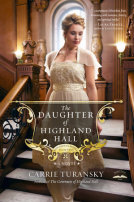 In the second Edwardian Brides novel, Katherine Ramsey, a headstrong debutante, is on the lookout for a titled husband so she can secure herself a future. However, her season in London goes disastrously wrong when a relative involves himself in a scandal that taints the whole family. No longer welcome socially, Kate begins spending most of her time with Jon Foster, a medical student and brother of her cousin-in-law-to-be, volunteering at a free East End clinic, helping the poor. Her heart is stirred by the service, but will she follow her heart or make the marriage expected of her?
In the second Edwardian Brides novel, Katherine Ramsey, a headstrong debutante, is on the lookout for a titled husband so she can secure herself a future. However, her season in London goes disastrously wrong when a relative involves himself in a scandal that taints the whole family. No longer welcome socially, Kate begins spending most of her time with Jon Foster, a medical student and brother of her cousin-in-law-to-be, volunteering at a free East End clinic, helping the poor. Her heart is stirred by the service, but will she follow her heart or make the marriage expected of her?Most books that involve a London season are set during the Regency period, so it was fun to read a story that takes place a hundred years later. Some things - the pretentiousness, the worldliness, the decadence - are the same, but there are a lot of differences too. I also like how Jon grew up in missions in India - the nineteenth century was a time of significant revivals throughout Europe, and Jon and his sister Julia would have been products of that movement.
Turansky does a good job emphasizing the need to be equally yoked - no matter how in love a couple may be, if only one has a relationship with Jesus, then their marriage will start out on rocky footing and have difficulty surviving. Kate's faith journey is quiet and sweet - no Paul-on-the-road-to-Damascus event, but rather a quiet and steady growth like many have.
It was fun to revisit William and Julia from the first book in the series. There were a few times I wished there had been more "showing" rather than "telling" of emotion and action, but all in all, it is a sweet story with a firm foundation in biblical truth.
Thank you Blogging for Books for providing a free book for the purpose of review; I was not required to make it positive, and all opinions are my own.
Edwardian Brides
1. The Governess of Highland Hall
2. The Daughter of Highland Hall
3. A Refuge at Highland Hall
More Info
Author Bio
Friday, October 10, 2014
"The Brickmaker's Bride" by Judith Miller
 Since her father's death in the Civil War, Laura Woodfield's mother has been trying to sell her father's brickworks, and finally they have a buyer: an Irish immigrant, Hugh Crothers. Laura's desire to see the brickworks succeed leads her to spend significant time with the purchaser's kind and honest nephew, Ewen, much to the consternation of the wealthy lawyer courting her. Unfortunately, Uncle Hugh has little financial sense, and poor business decisions put the immigrants' livelihood in jeopardy. Can they save the brickworks, or will Ewan lose his chance to send for his sisters in Ireland, as well as his chance at love?
Since her father's death in the Civil War, Laura Woodfield's mother has been trying to sell her father's brickworks, and finally they have a buyer: an Irish immigrant, Hugh Crothers. Laura's desire to see the brickworks succeed leads her to spend significant time with the purchaser's kind and honest nephew, Ewen, much to the consternation of the wealthy lawyer courting her. Unfortunately, Uncle Hugh has little financial sense, and poor business decisions put the immigrants' livelihood in jeopardy. Can they save the brickworks, or will Ewan lose his chance to send for his sisters in Ireland, as well as his chance at love?When reading historical fiction, I like to learn something new, and given that I knew little about West Virginia, this book proved an insightful glimpse into that under-appreciated part of our great and diverse country. I had no knowledge of brick making prior to reading this novel, but now I have a much greater appreciation for the makers of the bricks that form some of our country's oldest buildings - it's quite a process to make a product that stands beautiful and strong well over a hundred years later.
Laura and her mother truly model Christ's love - as frustrating as Margaret and Hugh Crothers are, they treat them charitably, above and beyond what they deserve. Even in the initial sale of the brickworks, they go far beyond their duty in ensuring that the new business prospers, and then they keep offering their support. Given how annoyed I was with the Crothers (and I am only a detached reader, not a neighbor who must deal with them on a regular basis), their kindness is astounding, and a great model.
The foolish financial decisions were quite a frustration to me; I realize people make poor decisions like that all the time (or there would be a lot less debt and foreclosure), but I cringed over and over at the Crothers' choices and how they treat their own kin. I read in horror of what they would do next . . . While this book will not make my top ten, I like the peek at history it provides. 4 stars
Thank you Bethany House for providing a free book for the purpose of review; I was not required to make it positive, and all opinions are my own.
Monday, October 6, 2014
Irene Hannon's "Decieved" - not necessarily as suspenseful as others, but riveting all the same
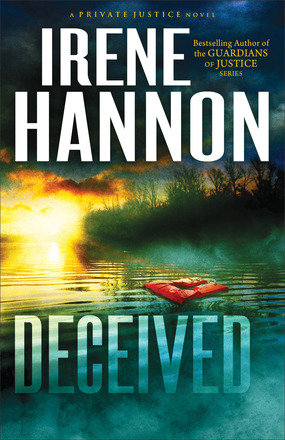 In the final novel of the Private Justice series, Private Investigator Connor Sullivan has quite the improbable case dropped in his lap: Kate Marshall - whose husband and son were declared drowned in a boating accident three years ago, though the boy's body was never found - swears she saw her son in the mall, and that he seemed to recognize her before vanishing with a man. As unlikely as the case sounds, especially since the drowning happened in New York, not Missouri, Connor determines to look into it and try to prove the boy's identity. As he investigates, suspicious circumstances keep cropping up - nothing concrete enough to go to the police, but enough to suggest that the boating accident that killed Kate's husband may have been no accident after all . . .
In the final novel of the Private Justice series, Private Investigator Connor Sullivan has quite the improbable case dropped in his lap: Kate Marshall - whose husband and son were declared drowned in a boating accident three years ago, though the boy's body was never found - swears she saw her son in the mall, and that he seemed to recognize her before vanishing with a man. As unlikely as the case sounds, especially since the drowning happened in New York, not Missouri, Connor determines to look into it and try to prove the boy's identity. As he investigates, suspicious circumstances keep cropping up - nothing concrete enough to go to the police, but enough to suggest that the boating accident that killed Kate's husband may have been no accident after all . . .One thing that impresses me is the work ethic of the private investigators in this series; they do the legwork, even hours of fruitless surveillance, phone calls that amount to nothing, and digging through barrels of trash. Everything they work on is within the confines of the law; they are meticulous about running an exemplary business. They explain why they have to use certain tactics, some of which border on unethical - like "pretext" (making up a story to gain information) - but it is always with the intent to see justice done and lying as little as possible. As one of the three men on the team, Connor makes for a strong, honorable hero.
Villains can make or break a suspense, especially when it comes to their motives. While very different from the other villains in the series, this one is fascinating - he isn't a chillingly creepy guy like in Trapped, but rather the sort that can wreak havoc with the reader's sympathy. I don't want to give away too much, but his story, his motives, his feelings for the child in his care - they really add an extra dimension to the story. This villain is perfect for this novel!
Though the premise of this story is an incredibly unlikely coincidence, I love what the author has to say about it: "Coincidence is a small miracle in which God chooses to remain anonymous" (335). I've seen a number of crazy things labeled as coincidence, but God's hand is always behind them. Is the plot of this novel unrealistic? Yes, by the world's standards. But God is sovereign, and unlikely and impossible things happen every day - nothing is too small or too big for Him.
Hooray for intelligent characters who recognize the gravity of the situation and don't run around doing stupid things they know will compromise their safety! Too often that is the impetus for moving a suspenseful plot forward, but thankfully not in this book. I also appreciate that Kate realizes she must prepare for a child who no longer knows her and who has been raised by someone claiming to be his father; she knows life is going to be really tough on that little boy, caught in the cross-hairs as he is. Though Deceived does not have the same intense, creepy-scary suspense as Trapped (book two), it is a gripping read and hard to put down.
Thank you Revell for providing a free book for the purpose of review; I was not required to make it positive, and all opinions are my own.
Private Justice
1. Vanished
2. Trapped
3. Deceived
Subscribe to:
Posts (Atom)
